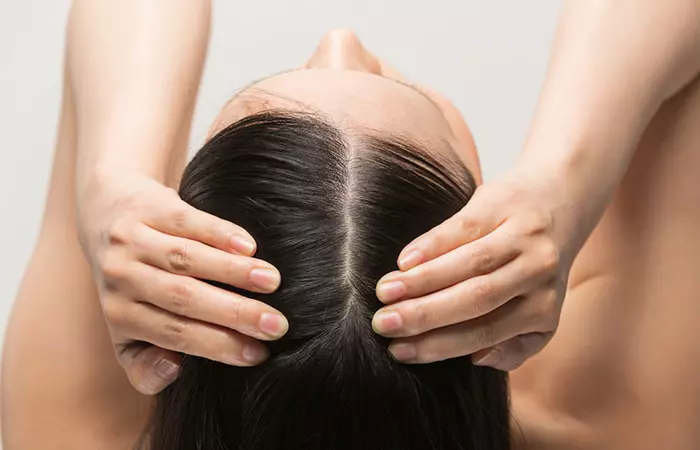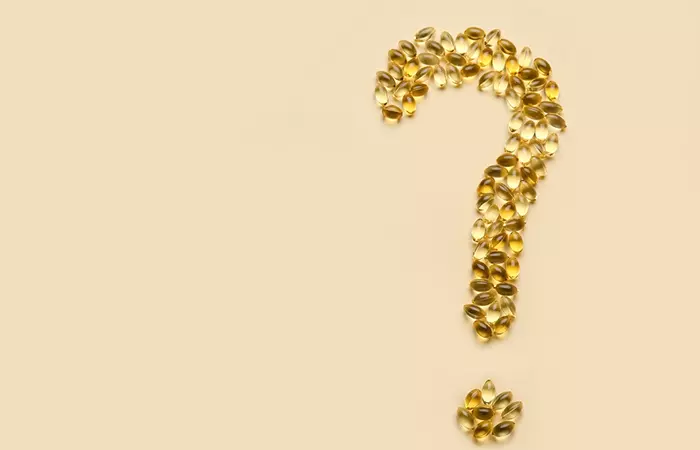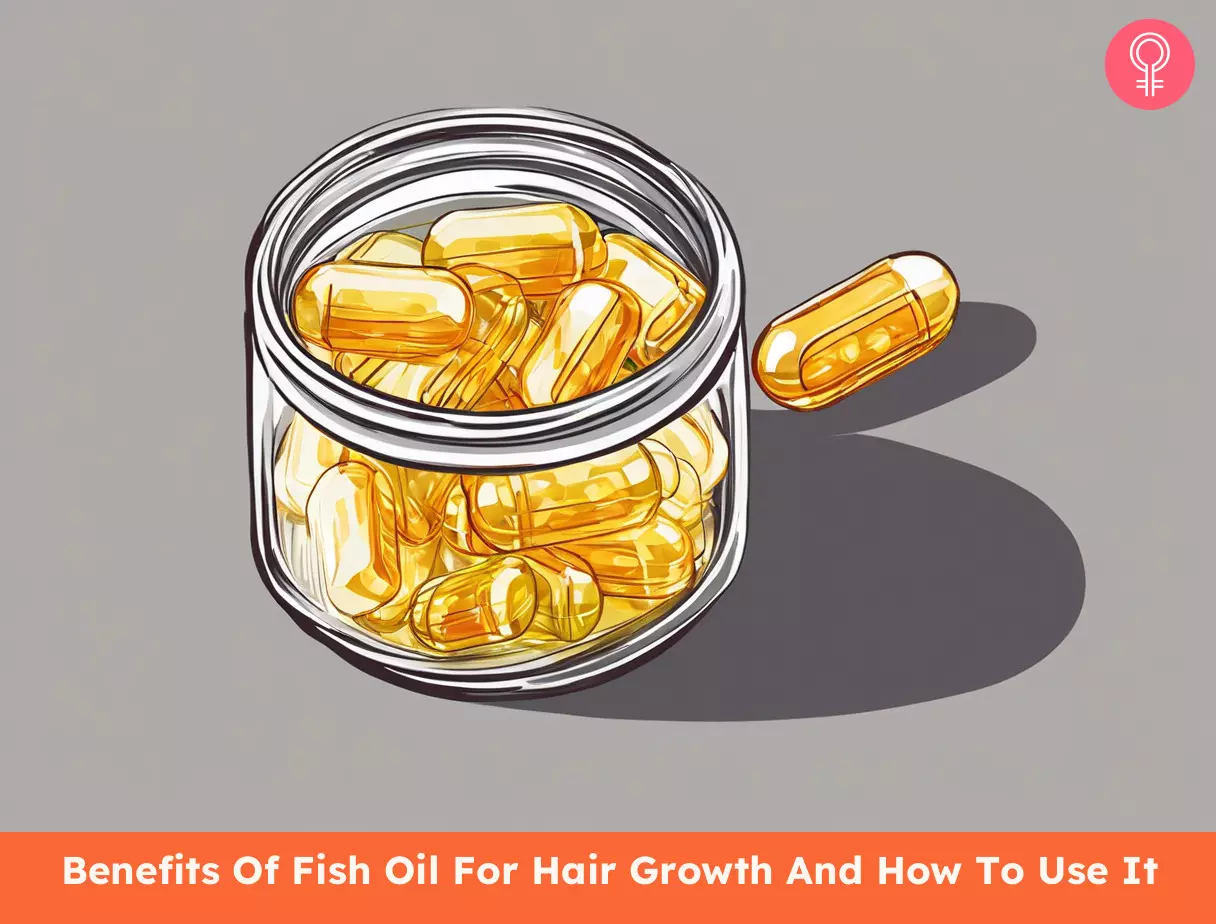Who Can Consume It? Anyone can consume this except people with a fish oil allergy, diabetes, and liver disease. How Often? You can consume 1.1 g to 1.6 g daily. Caution Overconsumption of fish oil may lead to headaches, indigestion, nausea, rashes, and diarrhea. Fish oil has various benefits for hair. Let us explore them in the following section.
How Does Fish Oil Benefit Hair?
1. Stimulates Hair Growth
Mackerel is a fatty fish rich in nutrients. In a mice study, mackerel-derived fermented fish oil increased the proliferation of dermal papillai A component of the hair follicle that consists of mesenchymal cells that play a major role in the regulation of hair growth. cells, thereby stimulating hair growth. The oil prolonged the anagen phasei The first and the most visible and longest phase of the hair growth cycle that can last between two to eight years. of the hair follicle growth and increased the hair shaft’s life period (2).
2. Improves Scalp Health
Fish oil has antibacterial properties (3). The oil may help keep the scalp clean and improve hair and scalp health. It helps protect skin against aging and dermatitisi A common term for non-contagious skin disorders categorized by itchy, dry, swollen, discolored, and irritated skin. . It also may promote wound healing (4).
3. Reduces Hair Loss
Omega-3s were also found to inhibit 5-alpha reductase, which produces the hormone that causes hair loss. The fatty acids also have anti-inflammatory properties that help reduce hair loss and improve hair health in terms of hair strength and volume (6). Belle, a YouTuber, has tried fish oil so she shares her insights in her video. She says, “I really like fish oil, I feel like omega-3s and fish oil in general is just really good for your body not just for hair growth so this one in particular, I just take it for my well-being (i).” These are a few of the important benefits of fish oil. In the following section, we will look at how you can use this natural remedy for hair growth.
How Do You Use Fish Oil For Hair Growth?
1. Include Fish In Your Diet
Fish is rich in omega-3 fatty acids that help improve hair health. The recommended fish include mackerel, herring, salmon, sardines, albacore tuna, and lake trout. Try adding fish oil to your recipes and smoothies. You may want to check if you are allergic to fish oil before adding it to your diet. The following graph from a study published in Current Opinion in Lipidology illustrates the fatty acid content of three of the most popular fish oil supplements in the US (based on sales). The majority of fatty acids in supplements are mainly composed of EPA and DHA, two essential omega-3 fatty acids. However, the concentration of these fatty acids differed between brands, making it difficult to generalize the supplements as a whole. Thus, one should carefully read about the nutrients on the product label and pick one that meets their needs.
Fatty Acid Content In Fish Oil Supplements In The United States
2. Take Fish Oil Supplements
You can also choose fish oil capsules or pills available on the market. A health professional can guide you properly about the correct dosage of these fish oil supplements.
3. Use A Hair Mask With Fish Oil
Fish oil is not often used topically because of its strong odor. But anecdotal evidence suggests that applying a blend of olive oil and fish oil to your hair offers nourishment and moisturization and works well as a hair care product. However, scientific studies are scarce in this aspect.
How Much Fish Oil Should You Take?
A dosage of 250–500 mg of omega-3 fatty acids per day should suffice (9). The dosage also depends on an individual’s needs. If you have any specific health condition, consult your doctor before taking a fish oil supplementation.
Precautions
Intake of fish oil and its supplements are generally considered safe. However, fish may also have the risk of mercury contamination (10). In this case, fish oil supplements from a reputed brand are preferable. Pregnant and lactating women may also benefit from fish oil supplements. When on supplements, stick to the prescribed dosage. Overconsumption of fish oil, as per anecdotal evidence, may lead to headache, indigestion, nausea, rashes, bad breath, and diarrhea. If you have any medical conditions, please check with your doctor before adding fish oil to your diet. Fish oil supplements may take some time to show results. Let’s understand in the next section.
How Long Does It Take For Fish Oil To Work For Hair?
The timeline for fish oil to impact hair health varies individually, typically taking several weeks to a few months to see noticeable improvements. A study involving 120 women found that taking omega-3 and omega-6 fatty acid supplements could promote hair growth after 6 months of use. It also helped reduce hair loss (11). Since fish oil is also loaded with these fatty acids, it might take 6 months to show any results. However, further research is needed to confirm fish oil’s consistent support for hair growth. Apart from that, genetic factors, dietary habits, and the severity of hair issues may also influence the rate of results. Consult a healthcare professional for personalized guidance on integrating fish oil into your hair care routine. Can I put fish oil directly on my hair? Yes, you can apply fish oil directly to your hair. But it has a strong, unpleasant odor. Is fish oil good for thinning hair? Fish oil contains omega-3 fatty acids, and consuming it may increase hair density (5). It stimulates hair growth, supports hair loss prevention, and improves your scalp and hair health. Can I take biotin and fish oil together? Yes. You can take biotin and fish oil together. However, consult your doctor before taking these supplements as they may cause nausea and other side effects.
Illustration: Benefits Of Fish Oil For Hair Growth And How To Use It













